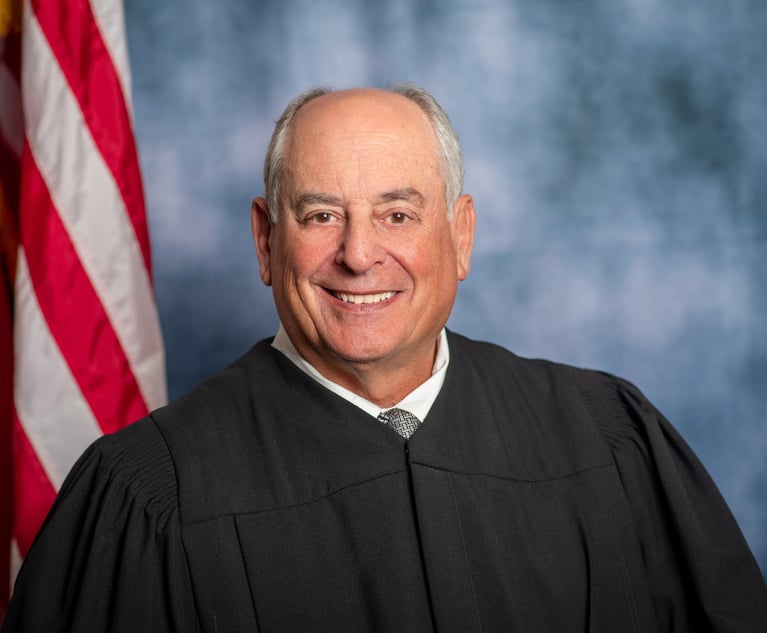 Justice Charles Bethel, Supreme Court of Georgia. (Photo: John Disney/ALM)
Justice Charles Bethel, Supreme Court of Georgia. (Photo: John Disney/ALM)Supreme Court Boosts Power of Trial Judge in Med-Mal Reversal
"The trial court's approval of the verdict creates a presumption of correctness which is not to be disturbed absent compelling evidence," Justice Charlie Bethel said.
October 07, 2019 at 04:41 PM
4 minute read
The Georgia Supreme Court gave a nod Monday to the power of the trial judge and jury.
Georgia's high court reversed its intermediate appellate court Monday over the legal standard for reviewing a medical malpractice case that began with what the patient described as the worst headache of her life. That headache 7½ years ago led to catastrophic injuries resulting from an undiagnosed ruptured brain aneurysm. Lawyers have been fighting ever since over the damages. The Georgia Supreme Court sent the case back to the Georgia Court of Appeals for another look.
"We conclude that the Court of Appeals applied the wrong standard in reviewing the trial court's decision, and so we vacate the judgment and remand the case with direction to apply the standard set forth in this opinion," Justice Charles Bethel wrote.
The unanimous opinion sets aside the Court of Appeals ruling that Shawn Evans is entitled to a new trial for his wife, Janice Evans. The high court opinion doesn't say they won't get a new trial. But it says the intermediate court will have to look at the case another way.
The DeKalb County State Court jury awarded nearly $1.2 million for past medical expenses and more than $67,000 for the husband's loss of consortium claim, but nothing for future medical expenses—even though she is permanently disabled and unable to care for herself. Plus, the jury apportioned only 51% of the fault to the defendant, Rockdale Hospital, cutting her award to just under $645,000. The couple asked for a new damages-only trial. The judge refused, leading to the appeal.
The Court of Appeals ordered a new trial in August 2018, ruling the half-million dollar verdict, which included past medical expenses but nothing for future expenses, or pain and suffering, was so meager as to "shock the conscience."
But that new trial is now uncertain with Monday's high court opinion.
Bethel focused on the difference between a trial judge's authority and that of an appellate court.
"As we have previously held, OCGA § 51-12-12 allows the trial court to interfere with a jury verdict in two opposite situations—where the award is so inadequate or so excessive as to be contrary to the preponderance of the evidence," Bethel wrote. "Moreover, an excessive or inadequate verdict is a mistake of fact rather than of law and addresses itself to the discretion of the trial judge, who, like the jury, saw the witnesses and heard the testimony. In fact, the trial court's approval of the verdict creates a presumption of correctness which is not to be disturbed absent compelling evidence."
The appellate judges weren't at the trial, Bethel noted.
"Appellate review, by contrast, involves a different analysis," Bethel said. "While trial courts have discretionary powers to set aside verdicts based on an analysis of the evidence they observed as described in OCGA § 51-12-12, appellate review is confined to the question of whether the trial court abused its discretion in deciding the motion for new trial on this ground."
Bethel said appellate judges are to "ensure that the trial court actually exercised its discretion in reviewing the award." But, he added, "an appellate court does not have the broad discretionary powers invested in trial courts to set aside verdicts, and when the trial court before whom the witnesses appeared had the opportunity of personally observing the witnesses has approved the verdict, this court is without power to interfere unless it is clear from the record that the verdict of the jury was prejudiced or biased or was procured by corrupt means."
In the ruling, the justices said they "must disapprove" of at least one of their previous holdings and a long list of previous Court of Appeals decisions that allow for a more expansive appellate review.
Lloyd Bell of the Bell Law Firm represents Shawn and Janice Evans. "We are still reviewing the opinion with our appellate team and have not yet decided on our next steps," Bell said.
Dan Huff and R. Page Powell Jr. of Huff Powell represent Rockdale Hospital.
Powell said Monday that while the Court of Appeals could still order a new trial, the strict standard for appellate review the Supreme Court highlighted will make it harder to do so. Bethel's ruling, Powell said, underscores the power of the trial judge and jury. He added, "It's really an affirmation of the sanctity of that system."
The case is Rockdale Hospital v. Evans, No. S18G1189.
This content has been archived. It is available through our partners, LexisNexis® and Bloomberg Law.
To view this content, please continue to their sites.
Not a Lexis Subscriber?
Subscribe Now
Not a Bloomberg Law Subscriber?
Subscribe Now
NOT FOR REPRINT
© 2024 ALM Global, LLC, All Rights Reserved. Request academic re-use from www.copyright.com. All other uses, submit a request to [email protected]. For more information visit Asset & Logo Licensing.
You Might Like
View All
North Carolina Courts Switch to Digital, Face Extreme Weather in 2024

'A 58-Year-Old Engine That Needs an Overhaul': Judge Wants Traffic Law Amended
3 minute read
Fulton Jury Returns Defense Verdict After Pedestrian Killed by MARTA Bus
8 minute read
'The Best Strategy': $795K Resolution Reached in Federal COVID-Accommodation Dispute
8 minute readTrending Stories
- 1Data Breach Lawsuit Against Byte Federal Among 1,500 Targeting Companies in 2024
- 2Counterfeiters Ride Surge in Tabletop Games’ Popularity, Challenging IP Owners to Keep Up
- 3Health Care Data Breach Class Actions Saw December Surge in NY Courts
- 4Florida Supreme Court Disbars 3, Suspends 11, Reprimands 1 in Final Disciplinary Order of 2024
- 5Chief Justice Roberts Ends Year With Defense Against 'Illegitimate' Attacks on Judiciary
Who Got The Work
Michael G. Bongiorno, Andrew Scott Dulberg and Elizabeth E. Driscoll from Wilmer Cutler Pickering Hale and Dorr have stepped in to represent Symbotic Inc., an A.I.-enabled technology platform that focuses on increasing supply chain efficiency, and other defendants in a pending shareholder derivative lawsuit. The case, filed Oct. 2 in Massachusetts District Court by the Brown Law Firm on behalf of Stephen Austen, accuses certain officers and directors of misleading investors in regard to Symbotic's potential for margin growth by failing to disclose that the company was not equipped to timely deploy its systems or manage expenses through project delays. The case, assigned to U.S. District Judge Nathaniel M. Gorton, is 1:24-cv-12522, Austen v. Cohen et al.
Who Got The Work
Edmund Polubinski and Marie Killmond of Davis Polk & Wardwell have entered appearances for data platform software development company MongoDB and other defendants in a pending shareholder derivative lawsuit. The action, filed Oct. 7 in New York Southern District Court by the Brown Law Firm, accuses the company's directors and/or officers of falsely expressing confidence in the company’s restructuring of its sales incentive plan and downplaying the severity of decreases in its upfront commitments. The case is 1:24-cv-07594, Roy v. Ittycheria et al.
Who Got The Work
Amy O. Bruchs and Kurt F. Ellison of Michael Best & Friedrich have entered appearances for Epic Systems Corp. in a pending employment discrimination lawsuit. The suit was filed Sept. 7 in Wisconsin Western District Court by Levine Eisberner LLC and Siri & Glimstad on behalf of a project manager who claims that he was wrongfully terminated after applying for a religious exemption to the defendant's COVID-19 vaccine mandate. The case, assigned to U.S. Magistrate Judge Anita Marie Boor, is 3:24-cv-00630, Secker, Nathan v. Epic Systems Corporation.
Who Got The Work
David X. Sullivan, Thomas J. Finn and Gregory A. Hall from McCarter & English have entered appearances for Sunrun Installation Services in a pending civil rights lawsuit. The complaint was filed Sept. 4 in Connecticut District Court by attorney Robert M. Berke on behalf of former employee George Edward Steins, who was arrested and charged with employing an unregistered home improvement salesperson. The complaint alleges that had Sunrun informed the Connecticut Department of Consumer Protection that the plaintiff's employment had ended in 2017 and that he no longer held Sunrun's home improvement contractor license, he would not have been hit with charges, which were dismissed in May 2024. The case, assigned to U.S. District Judge Jeffrey A. Meyer, is 3:24-cv-01423, Steins v. Sunrun, Inc. et al.
Who Got The Work
Greenberg Traurig shareholder Joshua L. Raskin has entered an appearance for boohoo.com UK Ltd. in a pending patent infringement lawsuit. The suit, filed Sept. 3 in Texas Eastern District Court by Rozier Hardt McDonough on behalf of Alto Dynamics, asserts five patents related to an online shopping platform. The case, assigned to U.S. District Judge Rodney Gilstrap, is 2:24-cv-00719, Alto Dynamics, LLC v. boohoo.com UK Limited.
Featured Firms
Law Offices of Gary Martin Hays & Associates, P.C.
(470) 294-1674
Law Offices of Mark E. Salomone
(857) 444-6468
Smith & Hassler
(713) 739-1250






